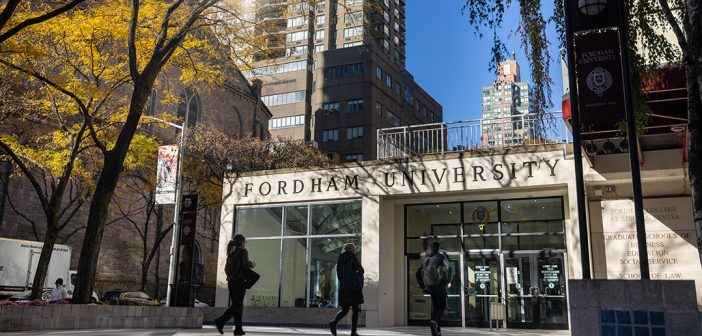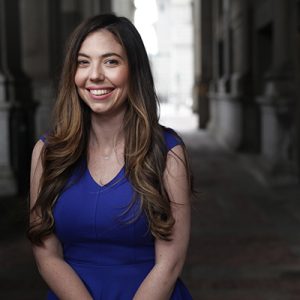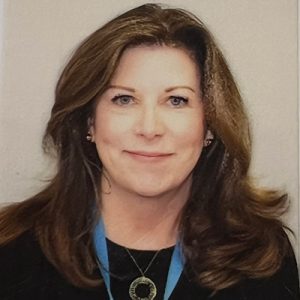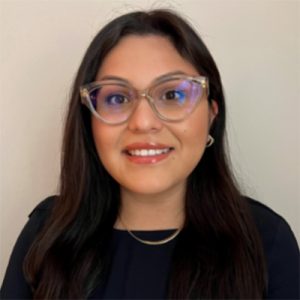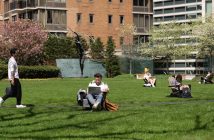The need for licensed clinical social workers is surging in New York City and across the country. Fordham’s Graduate School of Social Service educates students to stand up for social justice and human dignity, preparing them to meet this growing need and become leaders in a rewarding field.
Carolyn Donovan, GSS ’16, works at P.S. 86 in the Bronx, where she provides both individual and small-group counseling and is part of the school’s crisis team. At Fordham’s Graduate School of Social Service, she specialized in trauma and did her field placement at a foster care placement office while also working at the Good Shepherd Services’ family foster care program in the Bronx.
Every day at P.S. 86 is different, as Donovan helps connect families to the resources they need, whether they’re struggling with housing, food, or an immigration matter.
“Social work is a unique field,” she said. “It’s multidimensional and you get to make a difference and advocate for the well-being of the people you’re working with.”
Preparing ‘Agents of Change’ to Meet a Growing Need
Demand for social workers in the New York City area and across the country is skyrocketing, fueled by the mental health crisis during the pandemic as well as the aging of the Baby Boom generation. The U.S. Bureau of Labor Statistics projects that employment for social workers will grow faster than the average for all occupations, increasing by 9% by 2031 with about 74,900 openings predicted for each year.
Debra M. McPhee, Ph.D., dean of the Graduate School of Social Service, said the work of professional social workers is critical during these complex times.
“In this era of great change and global racial reconciliation, the need for knowledgeable, skilled, and compassionate professional social workers is as great as it has ever been. Social workers bring a unique perspective to society’s most challenging problems, serving as agents of change whether they are working with individuals, families, organizations, or communities,” McPhee said.Steeped in the Jesuit tradition of cura personalis—care for the whole person—Fordham runs the largest school of social work in New York state, graduating 1,000 students each year who go on to work in a range of settings, including public agencies, nonprofits, hospitals, and schools. Because of Fordham’s long, rich history in social work, students benefit from a supportive alumni network and from courses taught by faculty members with deep expertise in the field.
A Connection with NYC Schools
Roger Ball, GSS ’02, is a GSS adjunct faculty member and supervisor of school social workers for the New York City Department of Education. He said that Donovan’s holistic approach at P.S. 86 is a hallmark of Fordham graduates. A social worker from Fordham will take the initiative to seek partnerships with community-based organizations, he said, and find resources for the families at their schools.
“They aren’t just going in to provide clinical intervention,” Ball said. “GSS students at Fordham are learning about human rights, social justice, environmental justice, and economic justice, and they’re going in with that lens.”
Ball noted that GSS also works with NYC DOE schools on professional development for social workers, guidance counselors, assistant principals, and principals.
“That part gives the opportunity to go deep and build capacity,” Ball said. “These are resources that a lot of schools can’t afford. It allows kids to get the social-emotional and learning support and allows our emerging clinicians to get a rich body of experience.”
During the COVID-19 pandemic, the NYC DOE hired more than 400 social workers—“the largest amount at any point that I can remember in public education,” Ball said—and the schools still need more.
Leadership in Caregiving
Ellen Travers, GSS ’22, never planned to become a social worker. A former media planner and a mother of four, Travers’ path took a turn when two separate health crises rocked her family.
First, she served as the primary caregiver for her elderly father until he passed in 2006. That experience led her to volunteer at the Ken Hamilton Caregivers Center at Northern Westchester Hospital, which provides resources and support to caregivers. Then her husband, Paul, received a devastating diagnosis of metastatic renal cancer. She cared for him until he died in 2018.
Having navigated the complex medical, legal, financial, and emotional terrain of being a caregiver twice, Travers realized that social work was her true calling. In 2019, she enrolled in the Graduate School of Social Service. After finishing the MSW program and passing the licensing exam last year, she returned to the Ken Hamilton Caregivers Center—this time as the program manager.
“I needed to do something with all this caregiving in my life,” Travers said. “Getting a master’s degree in social work tied together my life circumstances with meaningful work. If you’ve been on the caregiving side, you understand the need. It’s impactful, it’s very simple, and it’s the right thing to do.”
Focusing on hospital social work, Travers was particularly interested in evidence-based interventions for the geriatric population. “I received an incredible education because of some exceptional professors who are professionals in the social work field,” she said. “I was fortunate to have access to the Henry C. Ravazzin Center on Aging and Intergenerational Studies and have Professor Janna Heyman as a mentor.”
A Flexible Program with a Variety of Specializations
A GSS education is designed to be flexible, both in terms of scheduling and curriculum, said Melba Remice, the assistant dean of admissions. Students can enroll full-time or part-time, taking evening and weekend classes at either the Lincoln Center or the Westchester campuses. GSS also offers hybrid and online options.
Students have the freedom to tailor their studies to their area of interest. In the first half of the program, all students receive the same foundational courses. In the second phase, they pursue their own course of study, which can include trauma, palliative care, and global policy through a unique collaboration with the United Nations. Most students are required to participate in two field placements.
Scholarships and Fellowships
One challenge to increasing the pipeline of social workers is the cost of a master’s degree. Almost half of new social workers are the first generation in their families to graduate from college, and affording graduate school can be difficult.
Fordham offers a number of scholarships and fellowships to help MSW students, including the Palliative Care Fellowship and the PIPELINE for Youth Health Fellowship program.
For Jessica Castillo, earning her MSW has been made possible by the Centennial Scholarship Award from Fordham GSS and Catholic Charities, which was established in 2018 and provides full tuition.
A first-generation Mexican-American who was once a mentee at Bigs & Littles, she returned to the organization to work as their receptionist after completing her undergraduate degree at St. John’s University in 2016. The Bigs & Littles staff encouraged her to go into social work and apply to Fordham.
Castillo now works full-time as the communications and development officer at Bigs & Littles NYC Mentoring and takes classes in the evening. She can already connect what she’s learning in her classes with the interactions she observes between social workers and clients at work.
“Bigs & Littles helped me so much and I want to give back,” Castillo said. “I had been thinking about going into social work, but I didn’t have the funds. Getting this scholarship felt like winning the lottery.”
‘The Force for Hope and Light’
For Donovan, Fordham’s ingrained commitment to social justice and the education she received prepared her for the realities and challenges of social work.
“In the field, you are going to come up against things where you need to be the force for hope and light,” she said. “Because I had a strong foundation from my classes and my professors, I was able to translate that into actual practice.”
FORDHAM GRADUATE SCHOOL OF SOCIAL SERVICE ADMISSION INFORMATION
Apply: Visit GSS for more information on prerequisites and the application process.
Information Sessions: Register for an information session or email [email protected] to schedule an appointment.
Upcoming Open Houses: Fordham GSS will hold open houses for its Westchester (4/15) and Lincoln Center (4/17) campuses. Learn more and register here.
—Mariko Beck
